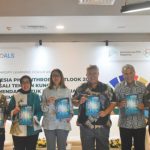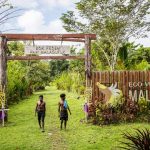Jakarta (Greeners) – Researchers encourage the concept of eco-hydrology to ensure clean and sustainable water availability in Indonesia.
Herry Yogaswara, a researcher for population research center at Indonesian Institute of Science (LIPI) said that rural areas require 60 liters of water per day meanwhile cities need an average of 110 liters per day and metropolitan cities need 150 liters per day.
“The gap for water demand in rural and city areas reflecting their lifestyle in relation to water consumption,” said Yogaswara in Jakarta, on Friday (25/05).
READ ALSO: KLHK Allocates 12 billion for Citarum River Waste Management
To provide clean water, government’s effort still could not keep up with the demands of 257 million people, with 1.49 percent of yearly growth, considering geographic condition, accessibility. Hence, water supply does not only about how the government can provide.
“[It] needs to look at initiatives from people to provide water, including on how this participation should responded by government,” he said.
Meanwhile, Ignasius Dwi Atmana Sutapa, researcher of LIPI’s Limnology research center, underlined eco-hydrology as the solution, as the concept is an approach for integrated water resources management.
“The eco-hydrology approach can improve quality of water resources by considering elements of ecology, hydrology, eco-technology and cultural,” said Sutapa.
READ ALSO: LIPI Develop Technology To Monitor Landslides
Furthermore, Sutapa said that LIPI has established a demo site in Saguling, West Bandung to practice, construct and introduce the concept of eco-hydrology. In addition, the site also serves as educational site also ensures direct benefit for local people.
“The concept we created is to monitor and improve water quality [but] we also provide pilot pools to be used for fish farming. So, it is a combination of not preserving water resources but also economical benefits for local people,” he said. “We tried to include people to start aware about the environment and show that eco-hydrology brings benefit for people.”
Rachmat Fajar Lubis, researcher for Geotechnology research center of LIPI, said that the concept covers basic ecological information, — water resources potential, environmentally friendly technology application and public participation –. The latest application of the concept is to reduce impacts of dry season predicted to peak in August to September this year.
“This concept and technology application has been applied in areas in Indonesia, including Kalimantan, Bangka island, Mojokerto of East Java, and Gerokgak of Bali with apparent results to reduce impacts of drought,” said Lubis.
Reports by Dewi Purningsih



















































